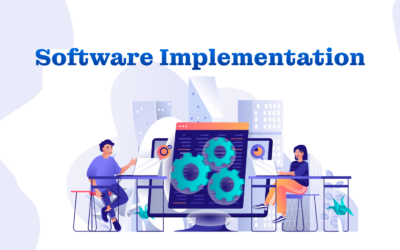AI is Transforming the Gaming Landscape

Introduction:
Welcome to our IT Services blog, where we unravel the mysteries of technology in plain language. Today, we’re diving into the exciting world where Artificial Intelligence (AI) meets gaming, reshaping the way we play, compete, and enjoy virtual worlds. In this beginner-friendly guide, we’ll explore how AI is transforming the gaming landscape, making games smarter, more immersive, and incredibly engaging.
Gaming has come a long way from the pixelated screens of yesteryears. With advancements in AI, games are no longer just programs that respond to button presses. They’re evolving entities, learning from players, adapting strategies, and crafting unique experiences tailored to individual preferences.
Join us as we journey through the fascinating realm of AI-powered gaming. We’ll uncover the magic behind procedural generation, the wizardry of adaptive difficulty, and the spellbinding potential of AI-driven storytelling. Whether you’re a seasoned gamer or just starting your adventure, this guide will equip you with insights into how AI is reshaping the future of play.
So, grab your controller, settle into your gaming chair, and let’s embark on a quest to discover how AI is revolutionizing the gaming landscape.
Emerging AI Trends in Gaming
Artificial intelligence (AI) is like the secret sauce that makes gaming super exciting. But let’s go beyond the surface and see how AI, along with other cool stuff, is changing the future of gaming. Get ready to discover the top AI trends in gaming that have popped up in the last few years.
1. Generative AI in Gaming
Generative AI is like a magic wand for game creators. It helps them make endless and always-new stuff for players to enjoy. Think about games like No Man’s Sky and Minecraft—thanks to generative AI, there’s always something new to explore.
Plus, generative AI makes the characters in games smarter and more lifelike. They learn and change as you play, making the games more fun and exciting every time.
2. Cloud-Based Gaming
The next big thing in gaming is streaming, which lets you play awesome games online using any device, including your phone. With cloud gaming, you don’t have to download or buy games, and you don’t need an expensive console or computer. Plus, you won’t lose your progress because you can pick up where you left off on any device.
But how does AI fit into cloud gaming? It’s like a secret ingredient that makes everything run smoothly. AI, powered by something called Deep Neural Network (DNN), helps the servers in the cloud work better, so even if your device is old, you’ll still have a great gaming experience.
3. Blockchain and NFT
In gaming, non-fungible tokens (NFTs) make in-game trading possible, giving players digital tokens they can use to trade and enhance their gaming experience. NFT games use blockchain technology to keep track of who owns what, making gaming fairer and more open for everyone.
But how does AI fit into NFT games? It helps game makers understand what players like by studying their data. This means they can create game stuff that’s just right for each player, making the gaming experience more special and personal.
4. AR, VR, and Metaverse
AI adds extra fun to online gaming by teaming up with AR, VR, and metaverse technology. Picture this: you create a whole virtual world and then hang out with your pals in it! Sounds awesome, right? Well, AI helps make all those cool virtual spaces possible.
The impact of AI on game development
The AI revolution has brought a wave of creativity and excitement to gaming. And it’s not just players who benefit. Now, developers can use smart computer programs to create loads of different levels for games. This means players always have something new to tackle.
Also, these AI tools can whip up all sorts of characters, making game worlds feel more real and interesting.
By using AI to handle these tricky jobs, game makers can work faster and make better games without spending as much time or money. Here’s how AI makes gaming better:
I. Greater personalization
Game makers rely on AI to keep things interesting for players by giving them a personalized experience. AI suggests games, levels, and challenges that match what players like. It can even suggest what to do next in the game.
Plus, AI can change how hard the game is based on how well the player is doing. This makes sure the game is fun, not too easy or too tough. And by giving players advice based on how they’re doing, AI helps them get better and have more fun.
II. Enhanced accessibility
AI is helping to make games more accessible to players with disabilities by breaking down barriers. For example, it can describe what’s happening on screen for players who can’t see well. Also, AI can learn how people play and adjust the game to fit their needs. It can even track eye movements, voice commands, or head movements to help players who have trouble moving.
And AI isn’t just for players with disabilities. It can change how fast the game goes and how things look to match what each player likes. This way, everyone can have fun playing the game, no matter what challenges they face.
III. Enhanced realism
With AI, games feel more alive than ever. Trees sway, plants grow and die, and the weather changes just like in real life. This adds depth and realism to the game world. AI creates trees and plants that grow over time and makes weather that affects how you play.
Plus, now games have more diverse and realistic characters. They can change their behaviour based on what you do and even take on your traits and feelings. These characters look and act like real people, with different faces, bodies, and personalities every time you play. This makes the game world feel more relatable and immersive, giving you a better gaming experience.
IV. Game optimization
To make games better, developers need to know how players are playing them. They use data for this. Then, they use AI to make sure their games work well on different devices.
AI figures out what kind of device a player is using, like what kind of processor and memory it has. Then, it makes the game look and run better on that device. This can help the game run faster and smoother, especially on older devices.
Also, AI can change how the game looks depending on the device. This can make the game run better on devices that aren’t as powerful, making them run smoother and faster.
V. Personalized analytics
AI is like a detective that looks at game data to find problems. It watches what players do, how long they play, and where they struggle.
This helps make the game fairer for everyone. AI gives feedback to developers based on what players do. This helps developers find what needs fixing in the game.
Use Cases of AI in the Gaming Industry
The influence of AI on gaming is huge and keeps growing, changing games to be more fun, flexible, and quick to react. Let’s dive into the different ways AI is making gaming awesome, pushing the industry forward.
1). Non-Player Characters (NPCs)
The coolest way AI helps in gaming is with NPCs. These are characters controlled by the game, not real people. But they act smart, like real players. They can’t be controlled by you, though, because they follow set rules.
These characters make games feel more real and exciting, giving you a different experience each time you play. Lots of game companies use AI to train these NPCs to act like the best players.
2). Image Enhancements and AI Upscaling
AI does wonders in gaming by making graphics better through ‘AI Upscaling.’ This smart trick turns low-quality images into sharper ones that look almost the same. It’s not just about reviving old games but also giving players top-notch visuals, even on old devices.
NVIDIA‘s DLSS tech is a great example. It uses AI to make games like ‘Cyberpunk 2077‘ and ‘Control’ look smoother and run faster, giving players a better experience.
3). Procedural Content Generation (PCG)
Making video games involves creating lots of stuff like characters, music, levels, and more. It takes a long time and costs a lot of money. But AI can help a lot. With AI, game makers can create more things faster, making game worlds more interesting and diverse. Plus, AI can even come up with new stories based on ones from before.
4). Player-Experience Modeling (PEM)
Player Experience Modeling (PEM) is a hot AI trend in gaming. It predicts what players will enjoy in a game based on their past choices. AI in PEM looks at how good players are and how they feel to change the game as they play. So, if a player is really good or not so good, the game adjusts to keep things fun and challenging.
5). Cheat Detection in Multiplayer Games
Cheating is a big problem in multiplayer games. It ruins the fun for everyone and can get players in trouble. Because cheating is getting worse, gamers worry about facing opponents who cheat to win unfairly. That’s why it’s important to use AI to watch how players move and catch cheaters.
Games like PUBG already use AI to spot cheaters and stop them. They’ve even banned top players who cheat.
6). Testing and Debugging
Testing and fixing games with AI tools is way faster than doing it by hand. These tools can check lots of complicated problems in the game’s code super quickly.
By using AI for these jobs, developers can find and fix mistakes faster, making testing games easier and quicker.
Conclusion:
AI is transforming the gaming landscape in remarkable ways, making games more immersive, accessible, and enjoyable for players worldwide. From creating dynamic environments to enhancing visuals and improving player experiences, AI is revolutionizing every aspect of gaming.
Through generative AI, games offer infinite possibilities, ensuring each playthrough is unique and engaging. Cloud gaming powered by AI enables seamless gaming experiences across devices, eliminating the need for expensive hardware. Moreover, AI-driven NPCs and player experience modelling enhance realism and adaptability, creating more immersive gameplay.
AI also plays a crucial role in ensuring fairness and security in gaming by detecting cheating behaviours and optimizing game performance for diverse hardware configurations. Additionally, AI-driven testing and debugging tools streamline the game development process, allowing developers to deliver higher-quality games more efficiently.
As the gaming industry continues to evolve, AI will undoubtedly play an increasingly significant role, driving innovation and pushing boundaries to create even more exciting and immersive gaming experiences for players of all backgrounds and abilities. With AI at the helm, the future of gaming is brighter than ever before.
Are you looking for any IT Services such as Software Testing, Web design and Development, Professional/Staff Augmentation Services, Cloud Computing, Mobile App Development, Digital Marketing Services and more? Connect Stridefuture Technology, which helps to meet your requirements.
{StrideFuture Technology, a full-service company specializing in Software Solutions and Consultancy services. We specialize in Personal, Business, IT Services, Software Testing, Web design and Development, Mobile App Development, Digital Marketing Services, and much more you can dream Virtually with us! Reach out for more service at StrideFuture Technology.}









